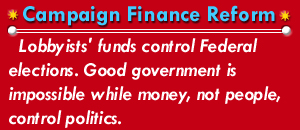|
|

Funding: Current (and Coming) Campaign Crises
 Many issues have dominated the American political landscape in the past few years, but only
very recently has campaign finance reform received the prominent status it so clearly deserves.
The issue is a complex one: the vast majority of Americans cannot explain the difference between
important concepts such as "hard money" and "soft money," and our elected officials are doing
little, if anything, to help the situation. In addition, while the issue of campaign finance
is, among members of Congress, admittedly a big one, it is still not receiving the attention
it should, nor are the proposed solutions approaching adequacy.
Many issues have dominated the American political landscape in the past few years, but only
very recently has campaign finance reform received the prominent status it so clearly deserves.
The issue is a complex one: the vast majority of Americans cannot explain the difference between
important concepts such as "hard money" and "soft money," and our elected officials are doing
little, if anything, to help the situation. In addition, while the issue of campaign finance
is, among members of Congress, admittedly a big one, it is still not receiving the attention
it should, nor are the proposed solutions approaching adequacy.
 The federal law which governs campaign finance divides campaign contributions
into two categories: hard and soft money. Hard money is given by individuals or
Political Action Committees (PACs)
directly to a candidate -- there are clear limits regarding the amount of money which
an individual ($20,000) or a PAC ($15,000) can give in hard money. Corporations, unions, and
other organizations cannot legally donate. Soft money, however,
which originated due to a blatant loophole in federal election law, is not controlled by
limits on who can donate or how much can be donated. Soft money contributions cannot go to
individual campaigns or candidates, but instead are targeted at the two major political parties.
The federal law which governs campaign finance divides campaign contributions
into two categories: hard and soft money. Hard money is given by individuals or
Political Action Committees (PACs)
directly to a candidate -- there are clear limits regarding the amount of money which
an individual ($20,000) or a PAC ($15,000) can give in hard money. Corporations, unions, and
other organizations cannot legally donate. Soft money, however,
which originated due to a blatant loophole in federal election law, is not controlled by
limits on who can donate or how much can be donated. Soft money contributions cannot go to
individual campaigns or candidates, but instead are targeted at the two major political parties.
In the 1996 elections, soft money contributions totalled more than $260 million, a figure
dwarfing the legal (at least in the spirit of the law) campaign contributions.
But the problem is getting even worse -- in the first half of 1997, the very beginning of the election
cycle for the 1998 mid-term elections, soft money contributions to the two
major political parties already had exceeded over $34 million.
The consequences of these excesses in campaign finances, especially, but not exclusively, soft money,
are farther reaching than any other issue in American politics. The impacts range from
demobilizing third party candidates, depressing voter turnout, and undermining the
central purposes of American democracy.
 One final thing to keep in mind: although the largest problem with contemporary campaign
finance is the (illegal) soft money contributions to the major political parties, hard money is
an infrequently mentioned, but still signficant, facet of the current crisis. At the
same time that politicians decry soft money abuses, they welcome their legal hard money donations,
all aimed at preserving the status-quo of American politics, included in which is the
present state of campaign financing. If ever there is to be real change in our political
system, the issue of hard money, as well as soft money, is going to have to be addressed.
One final thing to keep in mind: although the largest problem with contemporary campaign
finance is the (illegal) soft money contributions to the major political parties, hard money is
an infrequently mentioned, but still signficant, facet of the current crisis. At the
same time that politicians decry soft money abuses, they welcome their legal hard money donations,
all aimed at preserving the status-quo of American politics, included in which is the
present state of campaign financing. If ever there is to be real change in our political
system, the issue of hard money, as well as soft money, is going to have to be addressed.
-
Almost by definition, third parties and their candidates are significantly smaller than the
two major parties. Their fundraising base is correspondingly small. The unlimited amount of money which wealthy individuals, corporations, and labor unions
give to Democrats and Republicans is money that third parties simply cannot match. Clearly, the
money is essential to campaigns and even the "third" parties' credibility. As soon as
a campaign turns into a money-raising contest, it is no longer a contest for any and all third parties (with the exception of increasingly frequent self-financed campaigns).
But why can't third parties seek contributions from the individuals and groups giving large soft
money contributions? Two reasons: first, because the interests which the third parties represent
are often substantially different from what wealthy contributors want to see represented.
Second, under most circumstances there is really not much of a point in somebody donating even
several million dollars to a third party campaign, because the major parties will still out-raise
and outspend them, and, at least in Presidential elections, the electoral
college is a major obstacle in the path of any tangible third party success.
-
For a number of inter-related reasons, the huge corporate, union, and individual donations to the
two major political parties are
detrimental to the number of Americans involved in the political system which is, ultimately,
theirs. The noticeable absence of any "alternative" candidates in recent Presidential and
prominent Congressional races, at least a partial result of
our current campaign finance system, has certainly deterred voter participation. Why vote, one
may ask, if no candidate is really worth voting for? The argument that one should vote for the
"lesser of two evils," while maybe apt advice, is not particularly persuasive to a disenfranchised
voter.
Moreover, the current state of campaign finances in the U.S. is repelling, repugnant, and repulsive. Accurately or not, it paints a picture of our political system in which all
politicians are greedy pigs, concerned exclusively with their political and financial well-being,
not thinking twice about how their policy choices affect their constituents. This ubiquitous conception of American politicians is not particularly healthy, especially in terms of the Republic's long-term fate. Over history, growing disillusionment with the government has repeatedly sown the seeds of revolution and government dissolution. While such a crisis is not
imminent in America, people vote with less and less frequency at the same time that their distrust and hatred for government climbs -- not a good sign.
-
Finally, and perhaps most important, the U.S. Constitution grants each citizen the right to vote -- nothing more, nothing less. But the current state of campaign financing, especially on the federal level, makes a mockery of the spirit of that fundamental right. The American democracy, at least as envisioned by its Founding Fathers, is premised on a level playing field; in other words, each citizen should have the same say in the makeup of the democracy regardless of race, religion, gender, or even class. So long as individual or PAC contributions, not to mention those from unions and corporations, are tolerated, one of this democracy's basic purposes is fundamentally skewed and, ultimately, defeated.
This raises an interesting issue. Since campaign contributions are aimed at influencing the outcome of campaigns, then it is at least arguable that individuals should be able to donate to a campaign that they see as representing their interests. And even PACs and unions, which are organizations devoted to representing their members' views, are trying to influence the democratic process on their members' behalf -- an understandable position, if nothing more. But why corporations? Corporations are not, by any stretch of the imagination, organizations dedicated to voicing their members' opinions. Instead, they are money-making machines, and any contributions by them are aimed at maximizing the owners and shareholders' profits. It is downright ridiculous that something (not even a "someone") with no right to participate in this democracy in the first place should be so actively vocal, especially when at the expense of the country's legitimate voters.
More than any other issue in American politics, campaign finance reform must come from the
citizens, not the government, not the PACs, not the unions, and certainly not the corporations.
The seeds of this revolution have been sown for years now; let's take the final step and return American democracy to where it belongs -- with the people!

|











